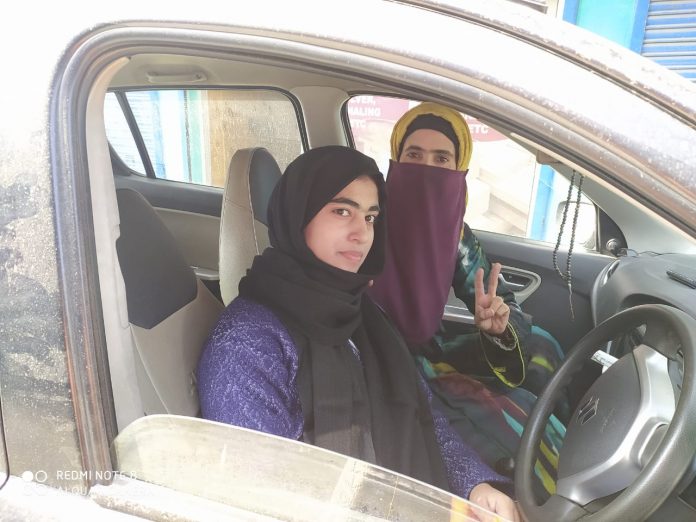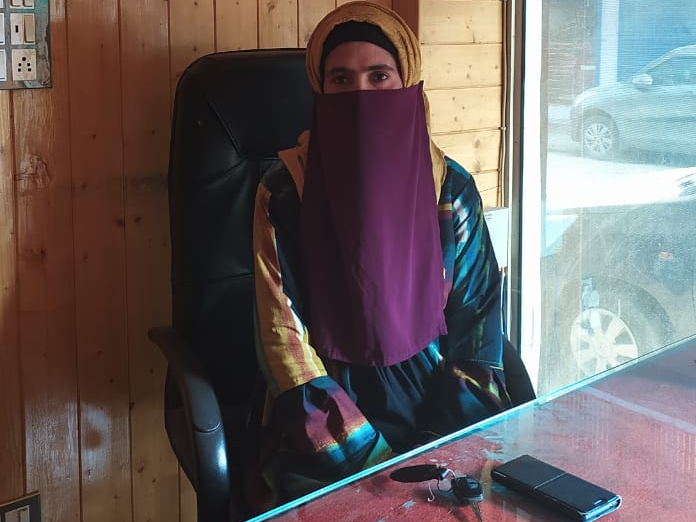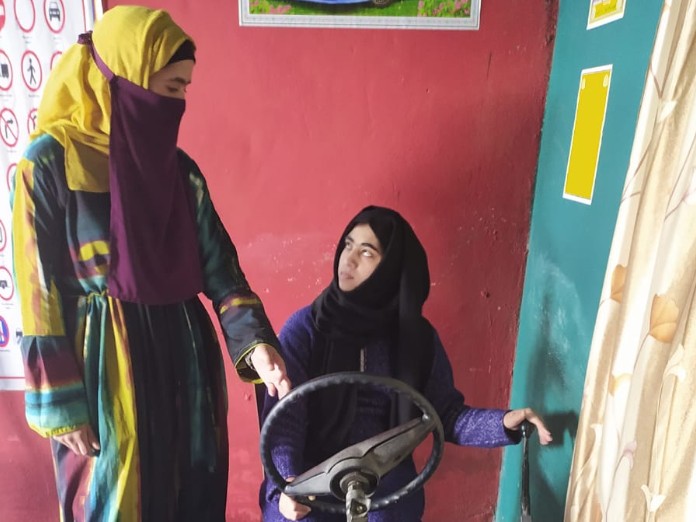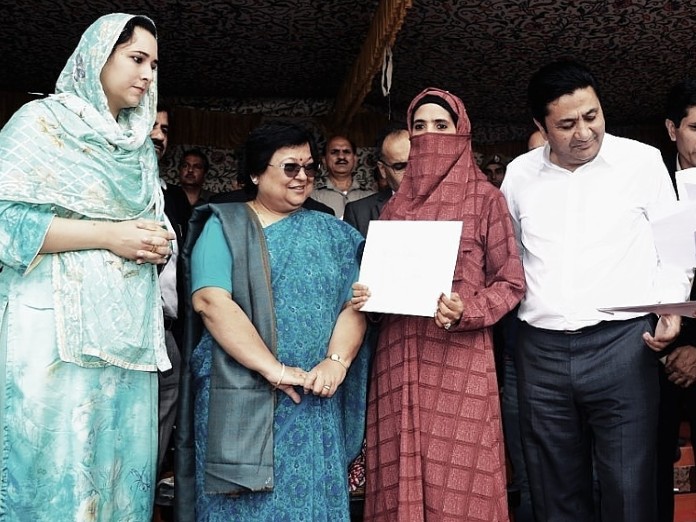
'Steer We Go': First driving institute for women in Kashmir is changing lives
Sustaining a lonely fight against socially enforced roles for her gender, 26- year-old Imana Aslam, reclaims the streets for women in Kashmir. On the driver’s seat, honking the competition away, she has setup the first driving institute for females in Kashmir. It is called ‘Steer We Go.’

Sustaining a lonely fight against socially enforced roles for her gender, 26-year-old Imana Aslam has been reclaiming the streets for women in Kashmir. On the driver’s seat, honking the competition away, she has set up the first driving institute for females in Kashmir. It is called ‘Steer We Go.’
For Imana, the new experience is liberating. It has helped her understand the anxieties and nervousness of the fellow females. The venture has empowered her to earn a decent living and create employment opportunities as well. She is the eldest among three siblings and shares their responsibility with her parents.
‘Steer We Go’ already has two employees and, considering the response from across the Valley, Imana may have to decide on expansion soon, to empower more women and create more jobs.
Related news: The saviours of Kashmir and the butchers of Baramulla
As of now she cheerily imparts the skill of driving to women in Srinagar and Budgam districts of Kashmir. Until now, she has trained over 200 women at the institute, many of whom have got the licenses to drive while others are in the learners queue.

The Beginning
Imana was a gym trainer earning ₹ 7,000 a month. The salary was meager and the bills were accumulating.
“I fought for an increment but the owner sacked me from the job,” says Emaan. She wanted to open her own gym, but lacked finances. She was frustrated. Perception about life, she says, was getting darker by every passing day.
Struggling to keep hope, she poured her heart out to a friend Nisha. But her friend was also going through chaos in her life. In the absence of round-the-clock availability of a male member, her family was struggling to take her father to hospital for a dialysis treatment as per the schedule. The family wanted her to learn driving but weren’t comfortable with a male driving instructor. “Her problem turned out to be Newton’s Apple type situation for me. I realised this gap in the driving instruction could be addressed,” says Imana. And she immediately enrolled for driving classes with a male instructor. She secured the license and her friend Nisha became her first student.
Related news: Indian Army restores Pakistani officer’s damaged grave in Kashmir
“Being a driver helped me during the government enforced lockdown imposed after the abrogation of Article 370 on August 5, 2019,” Nisha says. In the absence of public transport and male support at home, driving made her feel empowered, as she was mobile to take care of all the issues within the family. “Even in Covid-19 times, when nobody was ready to offer you a lift, I drove my father to hospital for treatment,” she adds.
In Kashmir, seeing women behind the wheels is a more recent trend compared to other parts in the region. However, it is only increasing now. The absence of adequate and comfortable public transport in Kashmir has also forced the females to either share a ride with family members and relatives or look for an alternative.
A senior official at the Regional Transport Office of Kashmir informed that they don’t segregate the data on the basis of gender, but the number of women applying for licenses has increased in the past few years. “A trend of female students and professionals driving two wheelers has also gathered pace,” he said.

200 women drivers and counting…
After Nisha became her first student in the summer of 2019, Imana went on to train over 200 women in Kashmir since then.
But the journey to register her driving institute was not as easy as it may look. It took her more than a year and scores of visits to Regional Transport Offices (RTOs) of two districts of Budgam and Srinagar to get it done.
“While I was shuttling between Budgam and Srinagar for registration, my family advised me to quit,” the driving instructor says. But she didn’t give up. And now she is reaping the benefits of her resilience and resolve. Her name as the ‘most-preferred’ driving instructor for females is circulating on social media groups, family WhatsApp groups and word of mouth. Recently, J&K High Court noticed her work and gave a certificate of appreciation as well.
One of Imana’s trainees, Daraksha, 40, is finally pushing the pedals successfully and feels indebted to Imana for her instructions and training. Her husband works in Dubai and she has to take care of the family here.
“My daughter and I could have never learned driving. We were not comfortable with a male instructor…Imana has made life easier for us and paved a new path of life for us,” says Daraksha from Budgam district. Imana is impacting lives and fellow women notice it well. On social media shegets encouraging feedbackfrom females who are already driving or want to drive.
Encouraging feedback
Sharing her experience, Dr Riffat Jan, who applauded Imana’s efforts, says that ‘learning to drive’ gives a female a control on her life and mobility. She doesn’t feel like a stepney that has to be driven around all the time. Her driving skill once saved a life of a child. From Lararea of Ganderbal district, Dr Jan says, she drove 30km to Srinagar, to rush a baby to SKIMS hospital for an emergency treatment. “He was not breathing and lack of health facilities in a far-flung area almost threatened his life,” she says. “I am happy that I could drive and save that life that day.”

Similarly, Ifra Khan’s driving skill has helped to manage her shattered life and bring some calm to her chaotic world. Barely a year after marrying a Kashmiri businessman based outside the country, she got separated. “I was pregnant when he divorced me,” Khan says. After the birth of her son, he was diagnosed of a severe congenital health ailment. “I had to take him to doctors frequently. The driving skill helped me cope with the stressful schedule.”
A leading makeup artist in Srinagar, Sabinaa Shafi shares how driving helped her to reach out to brides on their big day amid communication blockades and clampdowns in Kashmir. “Many times when my driver couldn’t make it because of the clampdown in Kashmir, I drove myself and reached to my clients making random guesses about the location and geography of the area,” she says. “This year my driver left the job due to Covid-19. But thankfully, since I know how to drive, I managed to reach to brides.”
In fact, during this Covid-19 pandemic, women who drive, say they don’t have to worry about infections, virus and non-availability of any transport.
Road blocks
Despite silently touching lives and becoming harbingers of change, women drivers say they face slangs, slurs, lecherous eyes and harsh overtakes on the road. That, however, hardly halts their ride. “It may dent our cars, but it will never dent our resolve,” vows Imana.
The driving instructor makes her trainees understand that less awareness about people’s own ignorance makes a road a very dangerous place. So, Imana trains her students to be patient and calm behind the wheels and never indulge in any act of road rage.
On expansion mode
From a struggling gym trainer to a successful driving instructor, Imana has come a long way. She is now looking forward to set up female driving institutes in all 10 districts of Kashmir. Her monthly income has increased manifold than what she earned as gym trainer. But she will need help and encouragement to fulfill her dream.
“People do call and encourage me but the journey ahead is challenging,” says Imana. She says that driving explores a completely different perspective of a city or town.
“Your own blind spots and those of others are exposed on the road…But women should not just learn how to drive and then sit at home,” says Imana. “They should actually drive on the roads and make a difference to their lives in this maddening noisy world.”


